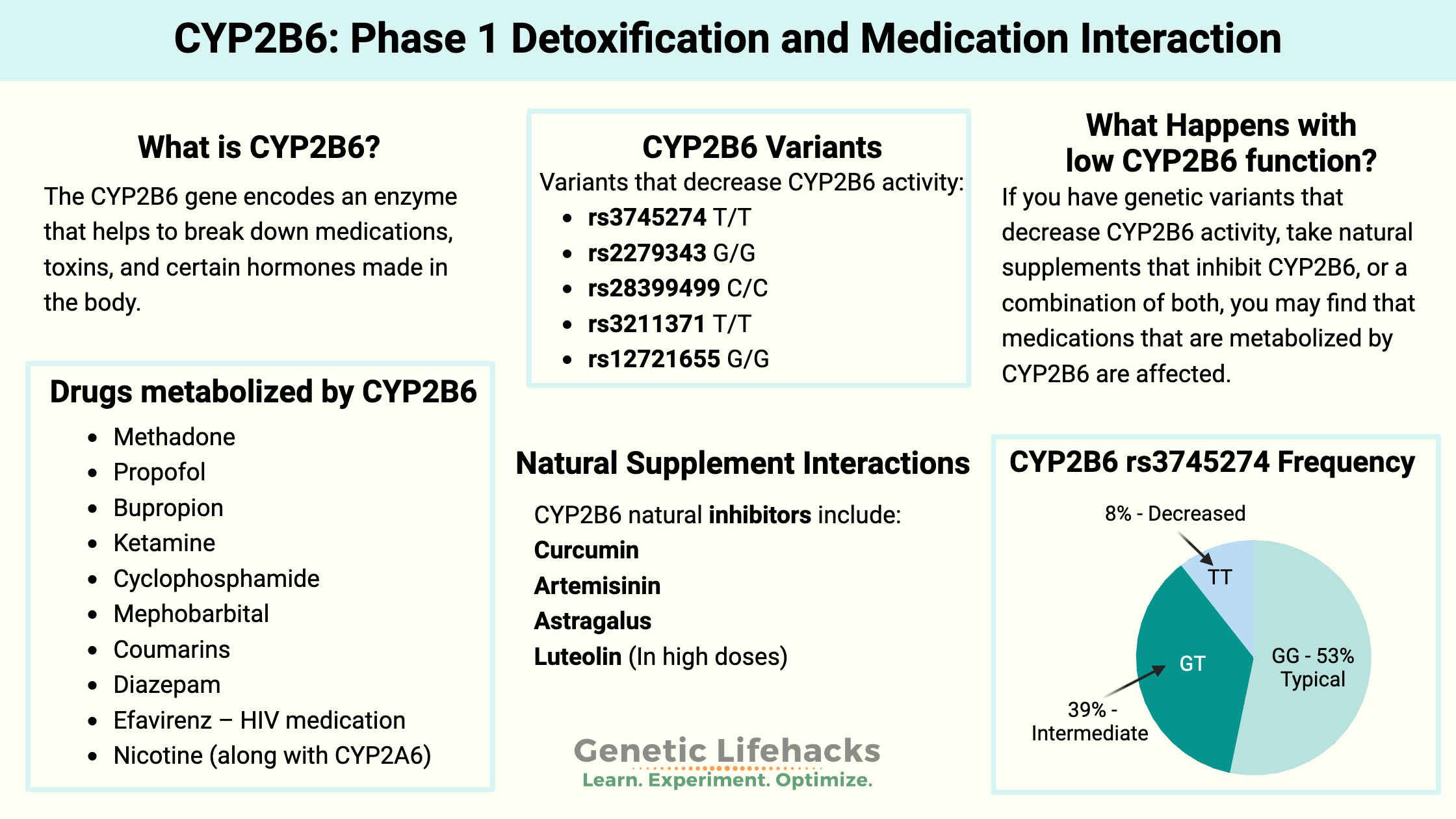Key takeaways:
~ The CYP2B6 enzyme is part of the body’s first line of defense in detoxifying and breaking down certain substances.
~ CYP2B6 is important for metabolizing several medications and genetic variants can affect how the medications work.
~ It is one in the family of CYP450 enzymes.
CYP2B6, genetic SNPs, and medication interactions:
The CYP2B6 gene is part of the CYP450 (cytochrome P45) family of phase I genes. It encodes an enzyme that helps to break down (metabolize) certain substances so that they are more easily eliminated from the body.
CYP2B6 breaks down medications, toxins, and certain hormones made in the body (endogenous substances).
Genetic variants in the CYP2B6 gene cause large variations in how the enzyme works, depending on the variant. For some people, genetic variants cause significant decreases in enzyme function, while others may have faster enzyme function.[ref]
CYP2B6 Drug Substrates:
Drugs metabolized by CYP2B6 include:[ref][ref][ref]
- methadone
- propofol
- bupropion
- ketamine
- cyclophosphamide
- mephobarbital
- coumarins
- diazepam
- efavirenz – HIV medication
- nicotine (along with CYP2A6)[ref]
- sertraline – (along with other CYP enzymes)[ref]
In general, CYP2B6 enzyme function is a little higher in women than in men.[ref]
Backup Routes:
Many drugs can be metabolized using multiple CYP enzymes. For example, diazepam primarily uses CYP2B6 for metabolism, but it can also be broken down by CYP2C19 or CYP3A4. So even if you have a genetic variant that impairs CYP2B6, you may still be able to take some of the medications that both CYP2B6 and other CYP450 enzymes metabolize.
Natural supplements metabolized by CYP2B6:
Just like prescription and OTC medications, natural supplements can also interact with the CYP enzymes.
Supplements metabolized by CYP2B6:
- dihydromethysticin (in Kava)[ref]
- gambogic acid
- epsilon-viniferin (from resveratrol) consumed with alcohol may inhibit CYP2B6 [ref]
Related article: Resveratrol: Genetic Interactions and Bioavailability
Natural inhibitors of CYP2B6 (watch for interactions with CYP2B6 medications):
- curcumin (turmeric)[ref]
- artemisinin, artemisia [ref]
- astragalus [ref]
- luteolin (only at high levels)[ref]
Endogenous substances broken down by CYP2B6:
While we often focus on drug interactions, the CYP enzymes all break down substances that are naturally made in the body – endogenous compounds. Similarly to drugs, many of the endogenous substances broken down by the CYP enzymes can also be metabolized by multiple routes, multiple enzymes. Thus, an impaired CYP2B6 enzyme may not be a huge problem unless combined with other CYP variants.
- estrone and 17beta-estradiol (along with other CYP enzymes)[ref]
- testosterone (minor route of metabolism through CYP2B6)[ref]
Phthalates are endocrine disruptors that can mimic estrogen. Some phthalates are also metabolized by CYP2B6.[ref]
What does CYP2B6 do besides break down medications?
An animal study in mice shows that reduced CYP2B6 function causes problems with metabolizing corn oil.
Mice with reduced CYP2B6 function ended up becoming more obese and having higher triglycerides and cholesterol (compared to normal mice) when fed a bunch of corn oil.[ref]
The CYP2B6 enzyme also metabolizes organophosphates at lower concentrations, such as from normal exposure to pesticide residue.[ref] Additionally, CYP2B6 is the only enzyme in the body that can break down methoxychlor, which is an insecticide used against flies. It is a banned substance in the EU and the US.[ref]
CYP2B6 Genotype Report:
Paywall for genotype report
Lifehacks:
If you are taking a medication that is metabolized using CYP2B6, talk with your doctor or pharmacist if you have questions about the dosage.
Interactions with slow CYP2B6:
Related Articles and Topics:
Phase I and Phase II detoxification
Learn how the different genetic variants in phase I and phase II detoxification genes impact the way that you react to medications and break down different toxins.
CYP2C9: Breaking down prescription medications
Have you ever wondered why certain medications don’t work well for you? Genetic variants can change how fast or how slow the medication is broken down in your body. Learn how the CYP2C9 variants impact quite a few prescription medications.
Nrf2 Pathway: Increasing the body’s ability to get rid of toxins
The Nrf2 (Nuclear factor erythroid 2–related factor) signaling pathway regulates the expression of antioxidants and phase II detoxification enzymes. This is a fundamental pathway that is important in how well your body functions. Your genetic variants impact how well this pathway functions.

